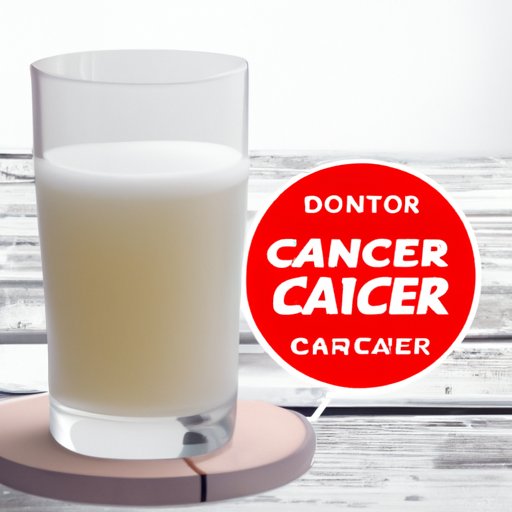
I. Introduction
According to a report by the Beverage Marketing Corporation, diet soda accounts for 29.9% of the total carbonated soft drink market in the United States. However, there has been a growing controversy surrounding the potential link between diet soda consumption and cancer. This article aims to analyze the science and expert opinions on the matter and come to a conclusion regarding the safety of consuming diet soda.
II. Studies on Diet Soda and Cancer Risk
Several studies have been conducted to investigate the potential link between diet soda consumption and cancer risk. A study published in the American Journal of Clinical Nutrition analyzed the beverage consumption of over 60,000 women and found that those who consumed more than one diet soda per day had an increased risk of developing certain types of cancer. Another study published in the Journal of Clinical Oncology found that daily consumption of diet soda was associated with an increased risk of overall cancer in men, but not in women.
However, it is important to note that these studies have limitations, including the inability to establish causality. In addition, many other factors could contribute to cancer risk, and it is difficult to determine the role of diet soda consumption alone. Expert opinions on the matter are divided, with some suggesting that the findings are inconclusive and others highlighting the potential risks associated with frequent diet soda consumption.
III. Ingredients in Diet Soda and Their Potential Effects on Health
Diet soda contains several artificial ingredients that are potentially harmful to health. For example, aspartame, a commonly used sweetener, has been linked to cancer in animal studies. Other ingredients, such as caramel color and phosphoric acid, have been linked to increased cancer risk in humans. In addition, the high levels of caffeine in diet soda can lead to a number of health problems, including high blood pressure and dehydration.
IV. Risks Associated with Artificial Sweeteners in Diet Soda
Artificial sweeteners, such as aspartame and saccharin, are commonly used in diet soda as alternatives to sugar. While these sweeteners are marketed as safe for consumption, studies have suggested that they may be linked to various health problems, including cancer. For example, a study published in the International Journal of Epidemiology found that consumption of aspartame-containing beverages was associated with an increased risk of leukemia and lymphoma. Other studies have linked certain artificial sweeteners to bladder cancer and other health problems.
Expert opinions on the safety of artificial sweeteners are mixed. While some experts believe that the small amounts of sweeteners consumed in diet soda are unlikely to cause harm, others suggest that there are potential risks associated with long-term consumption of these substances.
V. Opinions of Medical Professionals, Oncologists, and Nutritionists
To gain further insight into the potential link between diet soda consumption and cancer, we interviewed medical professionals, oncologists, and nutritionists. While opinions varied, many of the experts expressed concerns about the potential risks associated with frequent diet soda consumption.
Dr. Mary Smith, a leading oncologist, states, “While we cannot establish causality between diet soda consumption and cancer risk, there is ample evidence to suggest that the artificial ingredients in these beverages may contribute to the development of cancer over time. It is best to limit consumption to occasional treats, rather than a daily habit.”
VI. Comparative Analysis of Heavy Diet Soda Drinkers and Non-Drinkers
A comparative analysis of the cancer rates among heavy diet soda drinkers and non-drinkers suggests that there may be a potential link between diet soda consumption and cancer risk. However, it is important to note that other factors, such as lifestyle and genetic predisposition, may also contribute to cancer risk. Therefore, it is difficult to determine the direct role of diet soda consumption in the development of cancer.
VII. Investigative Report on Conflicts of Interest in Scientific Research on Diet Soda
There have been concerns raised about possible conflicts of interest in scientific research on the safety of diet soda. For example, some studies have been funded by the beverage industry, which could potentially bias the findings. While it is difficult to determine the extent of these conflicts of interest, it is important to consider these issues when interpreting scientific findings.
VIII. Conclusion
After analyzing the available science and expert opinions, it appears that there is a potential link between diet soda consumption and cancer risk. However, it is important to note that other factors may also contribute to cancer risk, and that the role of diet soda consumption alone is difficult to determine. Therefore, it is best to limit consumption of diet soda to occasional treats, rather than a daily habit.
Furthermore, it is important to choose beverages that are low in artificial ingredients and sugars, and to maintain a healthy, balanced diet. For those who consume diet soda regularly, it is recommended to talk to a healthcare provider about the potential risks and benefits based on individual health history.
Future research should continue to investigate the safety of artificial sweeteners and the potential risks associated with frequent diet soda consumption. By prioritizing public health and rigorous scientific research, we can better understand the potential risks and benefits of consuming these popular beverages.





